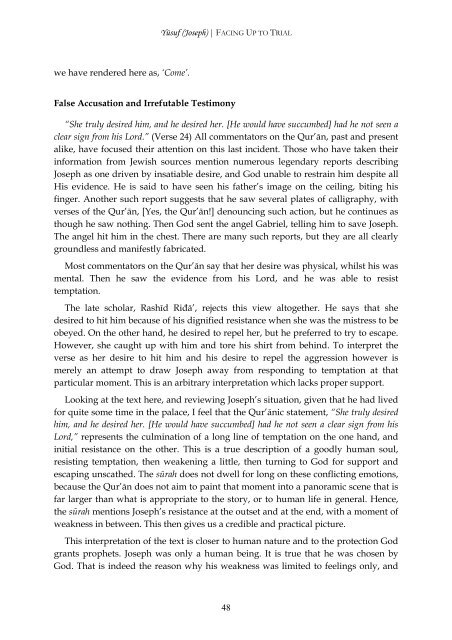Volume 10 Surah 12 - 15 - Enjoy Islam
Volume 10 Surah 12 - 15 - Enjoy Islam
Volume 10 Surah 12 - 15 - Enjoy Islam
You also want an ePaper? Increase the reach of your titles
YUMPU automatically turns print PDFs into web optimized ePapers that Google loves.
Yūsuf (Joseph) | FACING UP TO TRIAL<br />
we have rendered here as, ‘Come’.<br />
False Accusation and Irrefutable Testimony<br />
“She truly desired him, and he desired her. [He would have succumbed] had he not seen a<br />
clear sign from his Lord.” (Verse 24) All commentators on the Qur’ān, past and present<br />
alike, have focused their attention on this last incident. Those who have taken their<br />
information from Jewish sources mention numerous legendary reports describing<br />
Joseph as one driven by insatiable desire, and God unable to restrain him despite all<br />
His evidence. He is said to have seen his father’s image on the ceiling, biting his<br />
finger. Another such report suggests that he saw several plates of calligraphy, with<br />
verses of the Qur’ān, [Yes, the Qur’ān!] denouncing such action, but he continues as<br />
though he saw nothing. Then God sent the angel Gabriel, telling him to save Joseph.<br />
The angel hit him in the chest. There are many such reports, but they are all clearly<br />
groundless and manifestly fabricated.<br />
Most commentators on the Qur’ān say that her desire was physical, whilst his was<br />
mental. Then he saw the evidence from his Lord, and he was able to resist<br />
temptation.<br />
The late scholar, Rashīd Riđā’, rejects this view altogether. He says that she<br />
desired to hit him because of his dignified resistance when she was the mistress to be<br />
obeyed. On the other hand, he desired to repel her, but he preferred to try to escape.<br />
However, she caught up with him and tore his shirt from behind. To interpret the<br />
verse as her desire to hit him and his desire to repel the aggression however is<br />
merely an attempt to draw Joseph away from responding to temptation at that<br />
particular moment. This is an arbitrary interpretation which lacks proper support.<br />
Looking at the text here, and reviewing Joseph’s situation, given that he had lived<br />
for quite some time in the palace, I feel that the Qur’ānic statement, “She truly desired<br />
him, and he desired her. [He would have succumbed] had he not seen a clear sign from his<br />
Lord,” represents the culmination of a long line of temptation on the one hand, and<br />
initial resistance on the other. This is a true description of a goodly human soul,<br />
resisting temptation, then weakening a little, then turning to God for support and<br />
escaping unscathed. The sūrah does not dwell for long on these conflicting emotions,<br />
because the Qur’ān does not aim to paint that moment into a panoramic scene that is<br />
far larger than what is appropriate to the story, or to human life in general. Hence,<br />
the sūrah mentions Joseph’s resistance at the outset and at the end, with a moment of<br />
weakness in between. This then gives us a credible and practical picture.<br />
This interpretation of the text is closer to human nature and to the protection God<br />
grants prophets. Joseph was only a human being. It is true that he was chosen by<br />
God. That is indeed the reason why his weakness was limited to feelings only, and<br />
48

















